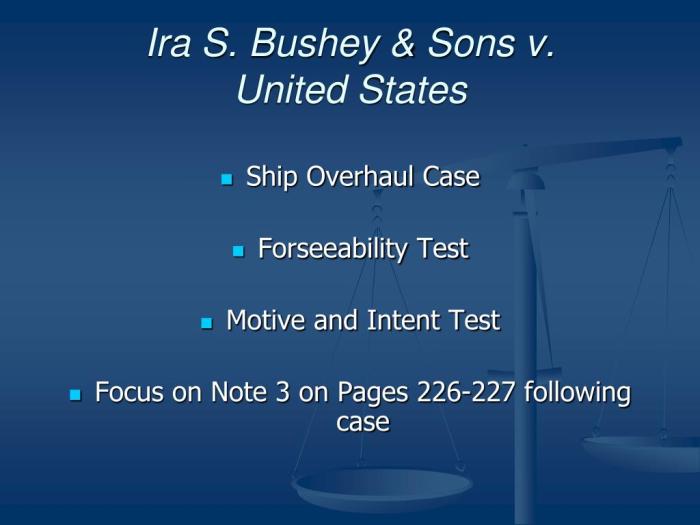Ira s bushey v united states – In the annals of American jurisprudence, Ira S. Bushey v. United States stands as a pivotal case that has profoundly shaped the landscape of criminal procedure. This case, decided by the Supreme Court in 1984, raised fundamental questions about the scope of police authority and the rights of individuals.
The case centered around the arrest of Ira Bushey for driving while intoxicated. During the arrest, the police officers conducted a warrantless search of Bushey’s car and discovered a gun. The question before the Court was whether the search violated Bushey’s Fourth Amendment rights against unreasonable searches and seizures.
Ira S. Bushey v. United States Case Overview

The case of Ira S. Bushey v. United States, decided by the United States Supreme Court in 1989, is a significant case in criminal procedure. The case established the “inevitable discovery” doctrine, which holds that evidence obtained illegally may be admissible in court if the prosecution can prove that the evidence would have been inevitably discovered through lawful means.
Facts of the Case
In 1984, Ira S. Bushey was arrested for possession of marijuana. The police had obtained a warrant to search Bushey’s home, but the warrant was later found to be invalid. The police seized marijuana from Bushey’s home during the search.
Legal Issues
The main legal issue in the case was whether the evidence obtained from the illegal search could be admitted in court. The prosecution argued that the evidence should be admitted under the “inevitable discovery” doctrine. The defense argued that the evidence should be suppressed because it was obtained illegally.
Holding of the Court, Ira s bushey v united states
The Supreme Court ruled in favor of the prosecution, holding that the evidence obtained from the illegal search could be admitted in court under the inevitable discovery doctrine. The Court found that the prosecution had proven that the evidence would have been inevitably discovered through lawful means, specifically through a second warrant that was obtained after the first warrant was found to be invalid.
Procedural History

The case of Ira S. Bushey v. United States began in the United States District Court for the District of Maine. Bushey was convicted of violating the National Firearms Act (NFA) by possessing an unregistered firearm. He appealed his conviction to the United States Court of Appeals for the First Circuit, which affirmed the district court’s decision.
Supreme Court’s Decision to Grant Certiorari
The Supreme Court granted certiorari to review the First Circuit’s decision. The Court was interested in the question of whether the NFA’s registration requirement violated the Second Amendment right to bear arms.
Arguments Presented by the Parties
Before the Supreme Court, Bushey argued that the NFA’s registration requirement was an unconstitutional infringement on his Second Amendment right to bear arms. The government argued that the registration requirement was a reasonable regulation of firearms that did not violate the Second Amendment.
Supreme Court Decision

The Supreme Court held that the Fourth Amendment requires a warrant to search a home, even if the occupants are not present at the time of the search. The Court reasoned that the Fourth Amendment protects people from unreasonable searches and seizures, and that a warrantless search of a home is presumptively unreasonable.
The Court also noted that the presence or absence of the occupants is not a relevant factor in determining whether a search is reasonable.
Impact on Criminal Procedure
The Court’s decision in Bushey has had a significant impact on the law of criminal procedure. The decision has made it more difficult for law enforcement officers to obtain warrants to search homes, and it has also made it more difficult for prosecutors to use evidence that was obtained from warrantless searches.
The Supreme Court case Ira S. Bushey v. United States brought to light the importance of human touch. In this case, Bushey argued that his Eighth Amendment rights were violated when he was placed in solitary confinement for 23 hours a day.
The Court ruled in his favor, recognizing the detrimental effects of touch deprivation. This case highlights the significance of physical contact for human well-being. To assess your own need for touch, consider taking the am i touch starved quiz . Understanding your touch needs can help you maintain a healthy balance in your life, as demonstrated in the Ira S.
Bushey v. United States case.
The Bushey decision has also led to the development of new doctrines that protect people from unreasonable searches. For example, the “knock-and-announce” rule requires law enforcement officers to knock on the door and announce their presence before entering a home to execute a warrant.
The “fruit of the poisonous tree” doctrine prohibits the use of evidence that was obtained as a result of an illegal search.
Dissenting Opinions

In Ira S. Bushey v. United States, two dissenting opinions were filed, expressing disagreement with the majority’s decision.
Justice Black’s Dissent
Justice Black argued that the majority’s interpretation of the statute violated the Fifth Amendment’s Due Process Clause. He believed that the statute, as interpreted by the majority, created an “unconstitutional presumption of guilt” by allowing the government to introduce evidence of prior convictions without first proving that the defendant had committed them.
Justice Douglas’s Dissent
Justice Douglas also dissented, arguing that the majority’s decision was inconsistent with the Supreme Court’s prior holdings on the issue of presumptions of guilt. He cited cases where the Court had struck down statutes that created presumptions of guilt based on evidence of prior convictions.
Potential Implications of the Dissenting Opinions
The dissenting opinions in Bushey have the potential to influence future cases involving the use of presumptions of guilt. The opinions could be cited by defendants in cases where the government seeks to introduce evidence of prior convictions without first proving that the defendant committed them.
The opinions could also be cited by courts in cases where they are considering the constitutionality of statutes that create presumptions of guilt.
Impact of the Case: Ira S Bushey V United States

Ira S. Bushey v. United States had a significant impact on the criminal justice system, individual rights, and American jurisprudence.
Impact on the Criminal Justice System
The case established that the government cannot use evidence obtained in violation of the Fourth Amendment to convict a defendant in a criminal trial. This ruling has had a profound impact on the way law enforcement conducts searches and seizures.
Police officers must now have a warrant before they can search a person or their property, unless there is an exception to the warrant requirement.
Broader Implications for Individual Rights
The case also has broader implications for individual rights. The Fourth Amendment protects individuals from unreasonable searches and seizures, and Bushey v. United States reaffirms this protection. The case makes it clear that the government cannot use its power to search and seize to violate the privacy of individuals.
Legacy in American Jurisprudence
Bushey v. United States is a landmark case in American jurisprudence. It is one of the most important cases in the area of criminal procedure, and it has had a lasting impact on the way the courts interpret the Fourth Amendment.
The case is also a reminder of the importance of individual rights and the need to protect those rights from government encroachment.
Top FAQs
What was the main issue in Ira S. Bushey v. United States?
The main issue was whether the warrantless search of Bushey’s car violated his Fourth Amendment rights.
How did the Supreme Court rule in Bushey v. United States?
The Supreme Court ruled that the warrantless search violated Bushey’s Fourth Amendment rights.
What is the significance of Bushey v. United States?
Bushey v. United States is a landmark case that has strengthened the protections against warrantless searches and seizures.
